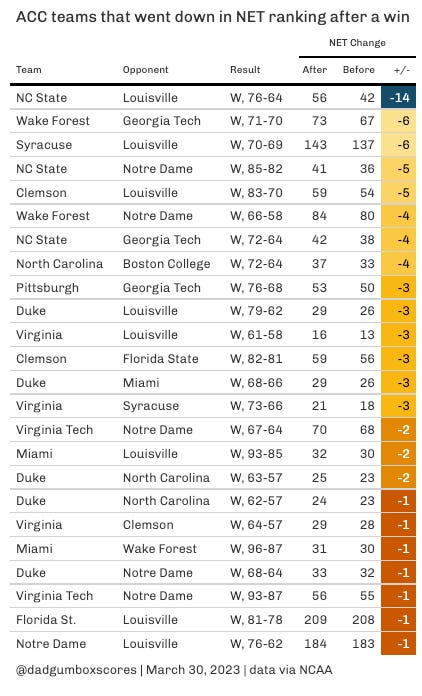024: 🏀 problem or narrative problem
A silly discussion around problems, the NET, and the ACC.
Miami is the 18th team from the Atlantic Coast Conference to advance to the Final Four since 2000. The conference has earned eight titles in that same span.
As a comparison, 16 teams from the Big Ten have advanced to the Final Four in that same timeframe. The leaders and legends have only one title (Michigan State, 2000).
Despite those numbers, ACC Commissioner Jim Phillips is working to change the narrative that the ACC is not an elite basketball conference. What this really means is Philipps wants to receive more bids to the tournament.
Why?
The answer is likely always money.
The NCAA distributes money to conferences, not individual schools, for success in the NCAA Tournament. The SEC earned ~$34 million despite not having a single member school advance to the Elite 8.
ACC teams have played in 40 tournament games over the past three NCAA Tournaments. This ranks behind the Big 12 (51), Big Ten (46), and the SEC (41).
It makes complete sense why Philipps wants ACC teams to earn more bids. It means more money for its members.
This sparked a fun reaction from Joe Lunardi. Joey Brackets counters that the ACC doesn’t have a narrative problem, it has a basketball problem.
While it’s easy to shoot the messenger when he’s inserted into an actual game broadcast with little value, Lunardi made at least one reasonable point.
The ACC is being dragged down by its bottom third. There are 24 instances in the NET rankings where a ACC team beat a conference opponent and went down in the NET.
Eight of those 24 wins came against Louisville and five came against Notre Dame. The Cardinals and Irish posted a 5-37 record in games against ACC competition this season.
Lunardi’s statement that less is always more when it comes to metrics is an opinion. I would say using the word “always” and “metrics” is silly. Sample sizes do matter. It’s obvious less is more when it comes to the NET and the size of your conference.
So, where does the ACC go from here?
First, the idea of conference strength is a bit of boondoggle. It only matters to increase the chance for more “quality” wins.
The unbalanced league schedule is a problem. The league is too big because it chased football money. 20 conference games is likely too much.
An obvious answer is to drop down to 18 conference games and schedule two more out of conference games. Those games could fall in January or February, perhaps a Big 12 or SEC challenge?
One other idea is to move to a trio of divisions made up of 5 teams. You can play home-and-away for teams in your division, and schedule one game against the other teams that rotates home and away each season. Coastal chaos, but for basketball.
An out of the box idea is December relegation. Imagine if Louisville and Notre Dame got booted out of certain league games for a season.
What if you played two conference tournaments? One tournament at a neutral site during December that includes a loser bracket and a minimum of three games against conference opponents.
It’s clear the league should try to change the narrative because it would mean more bids and more money. And a creative approach to scheduling would be a start.
One more time for the NET
My intention is for this to be the last time I write about the NET for awhile.
A gift to future me or maybe you - I’ve scraped all the NET rankings from the NCAA website. You can find the data in this Google Sheet. This data spans from December 4, 2022 to March 12, 2023 (day after selection Sunday), so knock yourself out and please ping me if you need the data in another format.
Here is the full list, sans Lunardi in the bunker, for those games where an ACC team won against a conference opponent and went down in the ratings.
The NET is likely better than the RPI. It’s less transparent and it brings lots of questions though. Debates about narratives or basketball problems.
There is so much information and data today for college hoops. AP and Coaches Polls. Torvik. KenPom. WAB. RPI. It’s great, but also really hard to grok.
It’s like trying to understand running water by catching it in a bucket. The way the information is presented often doesn’t help.
Because sometimes the messenger is more important than the message.
You can find the code for this chart here. It includes the function and script commented out to grab all the NET rankings too. Let me know if you have other questions.
Over the next few months, the plan is to likely write about things other than the ACC and men’s basketball. If you have any ideas or questions around college sports, and you want to ask a data question, please let me know.



